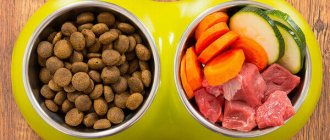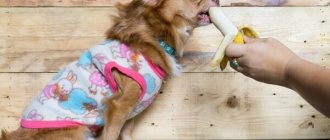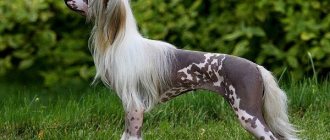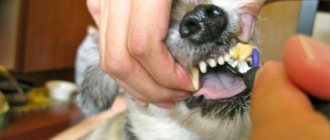Proper nutrition is the key to your pet’s health. A German Shepherd can only be fed a certain set of foods or high-quality ready-made food.
Representatives of the breed have a small gastrointestinal tract, high intestinal permeability and enzyme activity. These features must be taken into account when creating a diet.
Properly selected food will avoid digestive problems and prolong your pet's life.
General information about feeding your German Shepherd
Different types of nutrients do different jobs: proteins are used for growth and development, maintaining the dog’s muscle tone, carbohydrates and fats for energy, vitamins and minerals for maintaining tone, activity and health. The dog gets both from natural food and from dry food (super premium class and higher).
Overfeeding German Shepherds is just as harmful as feeding them inferior food. This leads to obesity and atherosclerosis. Increase portions in winter, with increased physical activity, for pregnant bitches; reduce for sedentary, old, sick dogs and in the summer. Monitor your dog's appetite and health. Playing immediately after feeding leads to volvulus (the stomach is very loosely “suspended”) of the intestines, so walk the dog before feeding.
Photo: pixabay.com
Prohibited Products
It is forbidden to feed your dog most of the foods found on the human table. Even if your pet looks with pitiful eyes, begging for a tasty morsel, you must be firm.
A German Shepherd cannot be fed:
- fatty meat;
- salted, smoked, pickled, fried foods;
- food with a lot of spices and herbs;
- sausages;
- sweets and baked goods;
- fish and tubular bones;
- citrus fruits, fruits with seeds;
- coffee, carbonated and alcoholic drinks;
- nuts;
- legumes
These products disrupt the functioning of the body, leading to systemic diseases and poisoning.
A puppy and an adult German Shepherd can be fed natural food or industrial food - the choice falls on the shoulders of the dog breeder. But in any case, the food must be of high quality, otherwise the pet will have health problems.
Feeding dry food
Dry food is convenient at home and does not require time-consuming preparation or effort to balance nutrients. But they are expensive, even economy class “drying”, which requires much more than super premium to saturate the dog. In addition to cheap food, you will also have to buy vitamins.
Feed your shepherd dry food twice a day.
Determine the daily serving size according to the table on the package. Table 1. Feeding the German Shepherd with food
| Index | Premium | Super premium |
| Daily serving size, g | 700-750 | 500-600 |
| Nutritional content, kcal/100 g | 300-350 | 350-400 |
| Digestibility, % | up to 75 | 90-97 |
| Balance | Needs vitamins, not suitable for sensitive dogs | balanced, especially specialized for the breed |
| Type of cereals | often unsuitable for "Germans" | corn (harmless for shepherds) |
The best dry food
| Type of feed | Class | Calorie content, kcal/100 g | Animal products, % (types) | Carbohydrates (cereals) |
| Duke's Farm Adult Large | super premium | 362 |
| rice, oats, barley, corn |
| Type of feed | Class | Calorie content, kcal/100 g | Animal products, % (types) | Carbohydrates (cereals) |
| Hill's Science Plan Canine Adult Advanced Fitness Large | super premium | 373 |
| rice, wheat, barley, sorghum, corn |
| Type of feed | Class | Calorie content, kcal/100 g | Animal products, % (types) | Carbohydrates (cereals) |
| Profine Adult Large Chicken&Potatoes | super premium | 370 |
| potatoes, corn |
| Type of feed | Class | Calorie content, kcal/100 g | Animal products, % (types) | Carbohydrates (cereals) |
| Acana Heritage Adult Large Breed | holistic | 337 (calorie content reduced to normalize weight) |
| — |
| Type of feed | Class | Calorie content, kcal/100 g | Animal products, % (types) | Carbohydrates (cereals) |
| Eukanuba Breed Specific Adult German Shepherd | super premium | 354 |
| wheat, corn, rice |
We also performed a detailed analysis of the following feeds: Proplan, Monje, Dog Chow, Brit.
You can choose food from the French company Royal Canin.
How to change your dog's food?
Transfer your dog from one brand of dry food to another, from “dry” to “natural” and vice versa for 1-2 weeks, gradually reducing the amount of the old and increasing the share of the new. The food needs to be changed if:
- there are signs of allergies: diarrhea, bloating, itching, hair loss in the armpits, groin, rump (hypoallergenic food),
- age category changes.
- the dog is sick (therapeutic diets),
- your pet is obese (reduced calorie food),
- the dog is healthy, but thin (more calories) or refuses to eat,
- pregnancy has occurred (food for puppies and puppy dogs).
General recommendations
Healthy feeding of a German Shepherd requires the following rules::
- food should be warm;
- it is necessary to adhere to the feeding regime;
- if it is necessary to change the diet, this should be done gradually;
- the bowl of food should be placed at the level of the pet’s chest - this will help avoid problems with posture;
- clean drinking water should always be freely available;
- the diet should be based on animal proteins;
- overfeeding should not be allowed;
- The shepherd dog should eat a single portion of food within 20 minutes; if there is food left in the bowl, it must be removed and the portion subsequently reduced.
Due to the digestive characteristics of dogs, food should be thick and contain a minimum of liquid . The optimal consistency is thick sour cream or puree.
Features of feeding puppies
Shepherd puppies grow quickly, their feeding regime and diet change quickly.
Determine whether you are feeding your German Shepherd puppy correctly by its fatness and weight: at 6 months it should not be more than 60% of its “adult” weight (25-40 kg).
Remove excess weight from your pet by reducing the calorie content of the food. One-year-old “Germans” and older are transferred to two meals a day. Table 3. Recommended diet for a German Shepherd puppy
| Puppy age, months | Frequency of feedings, once a day | Daily portion, glasses | What and how to feed |
| 0-1/2 | 10 | 2/3 |
|
| 1/2-1 | 6-7 | 2 |
|
| 1-2 | 5-6 | 2-3 |
|
| 2-3 | 5 | 3-4 incomplete |
|
| 3-6 | 4 | 5 (~1 liter) |
|
| 6-12 | 3 | 7-8 (~ 1.5 liters) |
|
If you feed your German puppy according to the norm, but he is still thin, rule out helminthic infestation and other diseases, and only then try to increase the portion.
Here is an example of feeding a one-month-old puppy porridge.
At what age do you start introducing complementary foods?
Experienced breeders recommend introducing complementary foods from two weeks of age, when puppies still drink their mother’s milk, but it less and less satisfies their need for new “building materials” for the body.
The most commonly used first foods are:
- cherry-sized balls of lean ground beef. For each puppy 2-3 balls;
- washed and scalded tripe or hearts;
- chicken eggs, grated and diluted with kefir;
- curdled milk and cottage cheese.
From three weeks you can gradually introduce cereals, vegetables and fruits. Puppies should have 24/7 access to clean drinking water.
What to feed an adult German Shepherd
The daily volume of food for an adult dog is approximately 1-1.2 kg (~ 2-3% of a dog’s live weight), eaten in 2 meals (~ 500-600 g at a time). Give your pet food at the same time, remove everything that he did not have time to eat in 15 minutes.
- sources of proteins: meat (beef), sea fish (not river fish), poultry (chicken, turkey), fermented milk (cottage cheese, kefir), eggs, cheese;
- carbohydrates: cereals (rice, oats, buckwheat), dried rye bread;
- fats: vegetable oils (sunflower, flaxseed, olive);
- vitamins and minerals: grains, fruits, vegetables, multivitamins.
Photo: maxpixel.net
Natural nutrition
If you want to feed your German Shepherd natural food, be prepared to spend a lot of time and effort preparing it. Combine meat, fish, meat by-products (liver, heart, tripe) and poultry (30-50%) with porridge (25-35%) and vegetables (5-20%). Make the most successful combinations the basis of the menu.
Fresh vegetables are preferable to boiled ones. If you feed fresh meat, deworm your pet regularly. Give fruits, crackers and seeds as an addition. Do not get carried away with bones, so as not to provoke constipation and obstruction in the shepherd.
Excess fish (more than twice a week) leads to a deficiency of B vitamins: they are destroyed, digestive problems occur, and growth is delayed.
Menu for the week
| Day of the week | Times of Day | What to feed |
| Monday | morning | beef, buckwheat porridge, grated baked carrots (zucchini) |
| evening | cottage cheese, buckwheat porridge, rye cracker | |
| Tuesday | morning | oatmeal with chicken, chopped bell pepper |
| evening | oatmeal, boiled egg, scalded chicken necks | |
| Wednesday | morning | like Monday |
| evening | like Monday | |
| Thursday | morning | beef liver, buckwheat porridge, apple piece |
| evening | kefir or curdled milk with cottage cheese, buckwheat porridge, liver | |
| Friday | morning | like Tuesday |
| evening | like Tuesday | |
| Saturday | morning | raw beef tripe, oatmeal, pumpkin |
| evening | oatmeal, cottage cheese, piece of apple (sweet potato), “sugar” seed | |
| Sunday | morning | scalded fish, rice, a little grated turnip (radish) |
| evening | fish, rice, boiled egg |
Watch a very useful video of an example of dinner from the owner of the German shepherd Baileys.
Vitamin and mineral supplements
German Shepherd puppies need special control of the amount of calcium, vitamins A and D in their food: an overdose is unacceptable, otherwise there is a risk of abnormal bone development and gastric volvulus.
Add a tablet of calcium gluconate and calcium glycerophosphate to the natural food (cottage cheese) of a one-month-old puppy, two tablets each for a two-month-old puppy, and so on until the age of six months.
Protect the growing “German” from dysplasia with the help of glucosamine and chondroitin sulfate preparations (Brevers, Cani Agil, Gelakan Darling, Excel Mobile, Excel Glucosamine, Calcidee, Chondro), they also contain calcium and phosphorus.
Adult dogs on a natural diet also need multivitamins (Stride Plus, Polydex Gelabon Plus, Beaphar Top 10, Nutri-vet, Kanvit).
Games and education
At any age, puppies are especially playful. A one-month-old puppy is no exception. They are active during games. During the game, you can offer your baby a toy instead of a stick, which he will happily carry in his teeth and run after it.
It is prohibited to pull an object from a child’s teeth that is sandwiched between the baby teeth. This can break fragile teeth and subsequently create an incorrect bite in the dog.
During games, the baby can grab any object with his teeth. To pick it up, you need to calmly give the command “Fu”, without raising your voice, and pick up the item. Increased intonation can cause cowardice in a puppy.
In an apartment, it is better to play with a puppy on the carpet. Slippery floors can cause falls and broken bones.
The health, physical development and character of the future friend and guard directly depend on the breeders.
Feeding a pregnant German Shepherd
Table 4. Recommended diet for a pregnant bitch
| Duration, weeks | Feeding frequency, once a day | What to add/subtract |
| 1-4 | 3 | increase the amount of cottage cheese and other fermented milk (for calcium), as well as fish (for the absorption of phosphorus and calcium) |
| 5-8 | 4 | increase the amount of fruits and vegetables, give vitamins D and A in winter |
| from 8 until birth | 5-6 | Give 150 g of fish instead of 100 g of meat, do not give bones at all |
| 1 after childbirth | 5 | exclude fish and meat (fermented milk in liquid form on the first day) |
| 2 and until the end of lactation | 3 | calcium and vitamins in increased quantities |
Nutrition for health problems
- Obesity: exclude diseases of the thyroid gland, problems in the gastrointestinal tract; reduce the size of portions, exclude bread and pasta from the diet.
- Hip dysplasia: low-calorie diet (less carbohydrates and fats, more proteins), chondroprotectors.
- Pancreatitis: low-calorie diet with light proteins (turkey, chicken) and a minimum of fiber, low-fat cottage cheese, yogurt, drinking small portions; for chronic pancreatitis, a lifelong diet.
- Liver diseases: fractional feeding in small portions at the same time; give boiled vegetables, fermented milk products, low-fat broths, drink decoctions of sage, chamomile, St. John's wort.
- Secondary hyperparathyroidism (“rickets”): food with low phosphorus and high calcium content (less meat).
- Eczema: diet enriched with sulfur, zinc, ascorbic and folic acids.
Photo: maxpixel.net
Owner reviews
Veta: “We have little experience with food, but I have already realized that the dog does not always prefer food with more meat. Mine has been eating natural food since childhood, and then I had to partially switch it to ready-made food. She gave me many different samples (there were even expensive grain-free ones) but I refused and didn’t even try. And I ate Happy Dog, although it’s like a porridge substitute, meat ingredients are not in the first place.”
Sergey: “So that my dog doesn’t get fat, I feed him twice, both in summer and in winter. Only his summer portions are reduced. German Shepherds are active dogs and need a lot of exercise. And without movement, he will get better in any case. I go jogging with mine as soon as possible. It’s good for the dog and good for me.”
Briefly about the main thing
- The German Shepherd is a large, active breed of dog that requires a high-energy diet.
- “German” puppies put a lot of stress on their joints, so their diet should not provoke obesity and dysplasia.
- The Shepherd does not need a varied menu; One or two basic combinations of products and additives are enough.
- A growing shepherd dog is very sensitive to the balance of calcium, phosphorus, vitamins A and D in the diet.
If you are an experienced German Shepherd owner, please share your opinion about this article, whether there are any shortcomings, and advise your feeding option for those who have just got themselves a Shepherd.
Did you like the article? Share it with your friends on social media. networks. This will help them get useful information and support our project.
How to avoid obesity
The tendency of German Shepherds to become obese is one of the reasons for careful monitoring of the quality and volume of food they consume and strict adherence to the feeding regime.
Your pet needs regular exercise and nutrition appropriate to its activity level .
If signs of excess weight gain appear, you should review your dog’s diet, reducing its calorie content.











